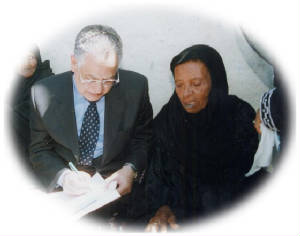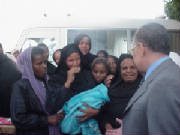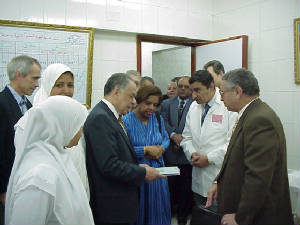|
|
Professor Sallam had a successful and diversified career medically, socially and politically. His contributions to Africa and the Middle East are numerous and mostly humanitarian. He worked as Professor of cardiovascular Surgery for the 35 years and still actively involved in the training of many heart surgeons who are now leading the most advanced cardiac centers in the Middle East and Africa. Prof. Sallam gained remarkable experience in the transfer of the Know- How from the North to the South and in leading many initiatives to improve the managerial skills in the Developing World. Dr Sallam is married to Wafia Eteiba, herself a Professor of Cardiology, and they have three sons: Tamer and Karim are medical doctors at UCLA and Stanford Universities. Hesham is finishing his PhD at Georgetown University. Dr Sallam is also an Expert and International Advisor on Health Policies, Global Health and strong advocate on Health for Peace. He is chairing three Charitable Societies deeply involved with comprehensive Development, Women Empowerment and Poverty Alleviation in Developing Countries. Dr Sallam received important international recognition for his achievements. Among these was the World Health Organization Prize in 1999 for his continued efforts in improving health to unprivileged groups In 2000, he was awarded the United Nation Prize for his outstanding contributions on the World Population issues, Women Empowerment and his courageous decision to abolish female genital mutilation in Egypt Ismail Sallam served as the Minister of Health and Population of Egypt from 1996 to 2002, the Chairman, Executive Bureau of the African Ministers of Health, Organization of African Unity: 1996 - 2001, The Chairman of the Board. Partners in Population and Development: 1997 - 2002 ; an organization that represent half the World Population, Member of the Executive Board of World Health Organization. Dr
Sallam graduated from Medical School at Ain Shams University in 1964 with Honors. Two years after his graduation, he obtained
Diploma of higher studies of Surgery with Distinction. He completed his training in Cardiovascular Surgery both in Britain
and the United States and obtained the Fellowship of the Royal College of Surgeons of England and of Edinburgh. He joined
the University of Glasgow Academic Department of Cardiovascular Surgery and he carried out impressive original research
work. These included: The development of Artificial Heart with very low rate of Haemolysis (1972).For this origimal work he
earned a Ph.D. degree from the University of Glasgow .Another unique record was his accurate quantitative evaluation in Vivo
of the rate of Haemolysis for different artificial valves used in replacing diseased valves. (1974).With the introduction
of modern Cardiac Pacing, Dr Sallam introduced new techniques for life saving in serious arrhythmia with artificial
pacemakers .
During his 6-year term as Minister of Health and Population (1996 -2002),
Dr Sallam lead health and population sector reform strategy that changed the image of Egyptian health care. His ground-breaking
vision was based on elimination of disparities within the health sector. He encouraged the integration of services and adoption
of holistic approaches to health care reform. .He succeeded in the implementation of health strategy reform which resulted
in marked achievements including; (1) Accessibility of the unprivileged and the vulnerable groups to quality health services,
Health Insurance extended to include all preschool-age children, and Women Health was insured as the right for every woman
in Egypt. (2) For the first time, Health was utilized as a principal tool in the alleviation of gender, socioeconomic, geographical
disparities. (3) Establishing quality network for primary health care, public health, laboratories; (4) Developing MIS. (5)
Developing well trained human resources. (6) Instituting proper surveillance and monitoring system.
 Dr
Sallam put forward a Strategy for the Social Sector for the prevention of terrorism and violence. The health sector adopted
a plan of actions directed towards the preservation of life by improving the Emergency Medical services with plans of action
in disasters. In addition, special studies took place to learn more about the areas from which the terrorists came, and active
steps were taken with social backing to improve conditions in these communities. He always held the view that terrorism is
preventable but we still need new skills and unification in our actions. He believed that comprehensive social development
and democracy are the tools in our fighting against terrorism but unfortunately we do not have a long term global strategy.
|



